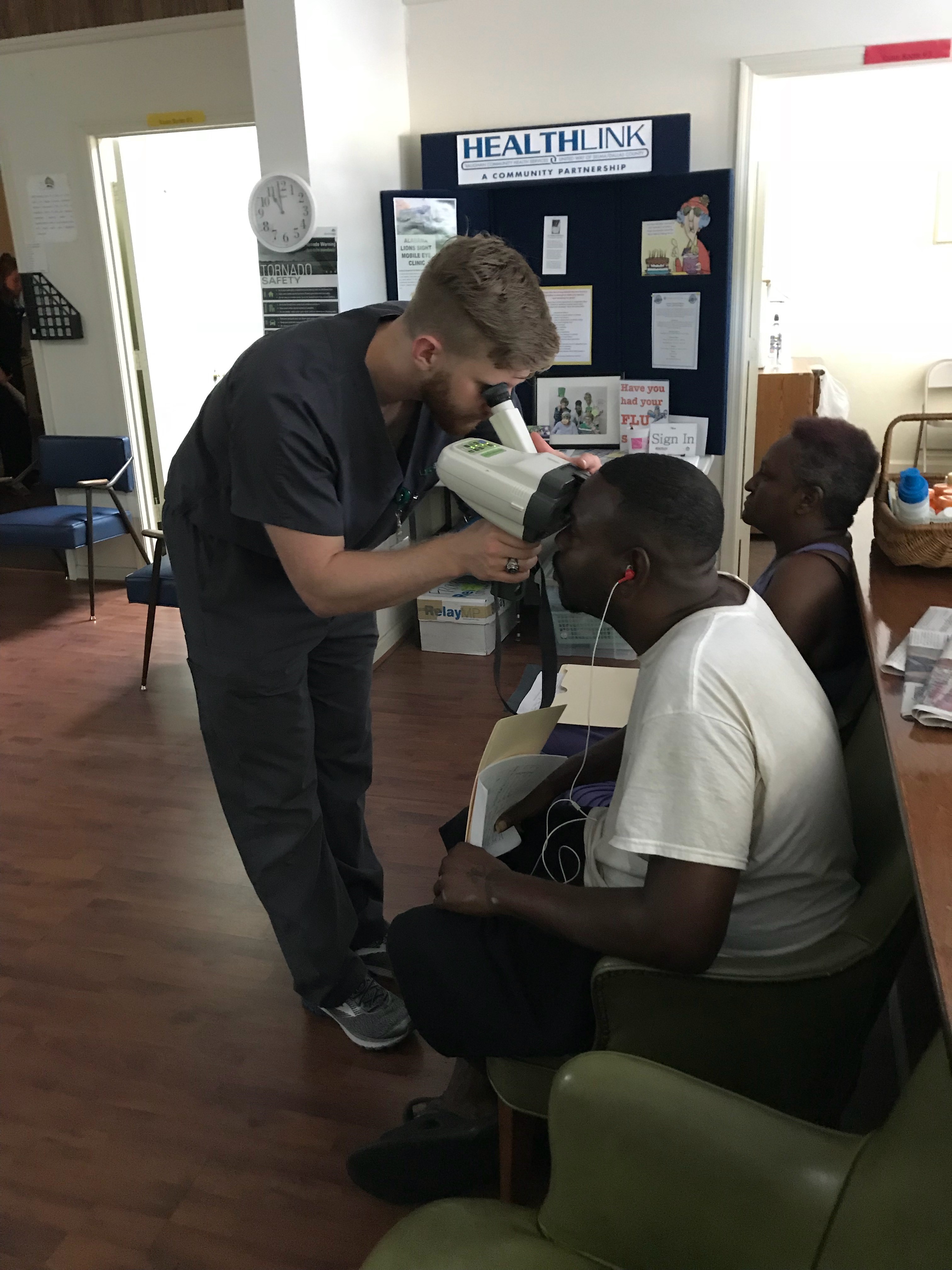The UAB School of Optometry began treating patients in Alabama’s Black Belt communities through a formally organized program in 2002. Since then, more than 13,000 patients in this underserved area of the state have received access to care from the school’s vision scientists, doctors, and students.
“The Black Belt Adult Eye Care Clinic project has been instrumental in reducing the number of patients suffering loss of vision due to various eye diseases,” said Mary Jean Sanspree, PhD, former director and associate scientist of education and research in Vision Science Research. “We are the bridge between the Black Belt communities and the vision clinics and doctors they need.”
Sanspree said the project began when the Vision Science Research Center (VSRC) saw a need for eye care in the Black Belt. The research grant that began the program was from the Centers for Disease Control under the name Rural Alabama Diabetes and Glaucoma Initiative (RADGI). There was also funding from the Centers for Disease Control, Lions International Foundation, Vision Service Plan and Central Alabama Community Foundation.
Grants that initially funded the opportunities to provide treatment in the Black Belt resulted in 10,000 patients receiving care. Once the grants ended in 2007 Community Eye Care (CEC), the outreach arm of the UAB School of Optometry, continued the work in combination with VSRC and grant assistance from the EyeSight Foundation of Alabama until 2012. Currently, small grants as well as various groups and individuals are donating funds that support the program.
Since CEC began leading the Black Belt efforts, eye and vision care have been provided to an additional 3,000 patients. Prior to the COVID-19 outbreak, recent Black Belt Adult Eye Care Clinics occurred one Saturday, eight months out of the year. The team of organizers works with the local Department of Human Resources (DHR) departments, health departments, churches, and outreach centers to identify the locations in need of vision and eye care. Between 16-18 interns, UABSO instructors as well as 5-7 other volunteers participate in the outreach events.
“The work begins on Friday afternoons with loading the vans and making sure we have the materials and equipment we need for our local mission trip,” said Janene Sims, OD, PhD and CEC director. “We usually leave UAB before the sun rises on Saturday mornings, grab breakfast en route, travel more than two hours, reach our destination, unload, set up, and begin seeing patients by 9:00. Like the Army—we do more before 9 AM than most people do all day.”
Shirley Wilson, EdS, Black Belt Adult Eye Care Clinic Project Coordinator, usually determines the rotation of the locations, and the CEC clinic coordinator, BB Jefferson, evaluates the school schedule to determine the Black Belt testing dates.
“The areas we select are to meet the needs of communities,” Wilson said. “Many times in the rural community, vision services are limited and elderly patients have a difficult time getting to appointments.”
The CEC team’s care goes beyond providing just an exam and findings. Volunteers explain the findings to the patients and provide handouts on various conditions. They provide feedback to primary care physicians about eye exam findings. Patients are referred for follow-up care, depending on financial need, through Medicare, Medicaid, Alabama Department of Human Resources, Alabama Lions Sight Conservation, or physicians within a reasonable geographic region.
Without the help of CEC and other organizations, many of these patients would not have any other access to eye specialists or healthcare.
“Many of those we help have viewed the world for years through blurry vision,” said BB Jefferson. “The impact is great because the quality of life is changed for the better.”
These clinics not only change the patients’ lives for the better but also provide learning opportunities for the students.
"Having the opportunity to care for underserved communities through Black Belt clinics has helped me grow both as a person and clinician,” said Sherry Sandri, a rising fourth year student. “I learned how to work better with a team, how to be resourceful, and how to be efficient. It's very rewarding to provide care for patients who normally don't have access."
The near future for Black Belt Clinics is in limbo due to COVID-19, in part due to the ever-changing health recommendations. Summer clinics were canceled.
“As things progress back to normal, we hope to continue our work in the underserved areas of Alabama,” Sims said. “I’m hopeful that our current third year students will be able to participate in this wonderful program and learn what local missions are all about. Mission begins at home, so let’s start here.”
